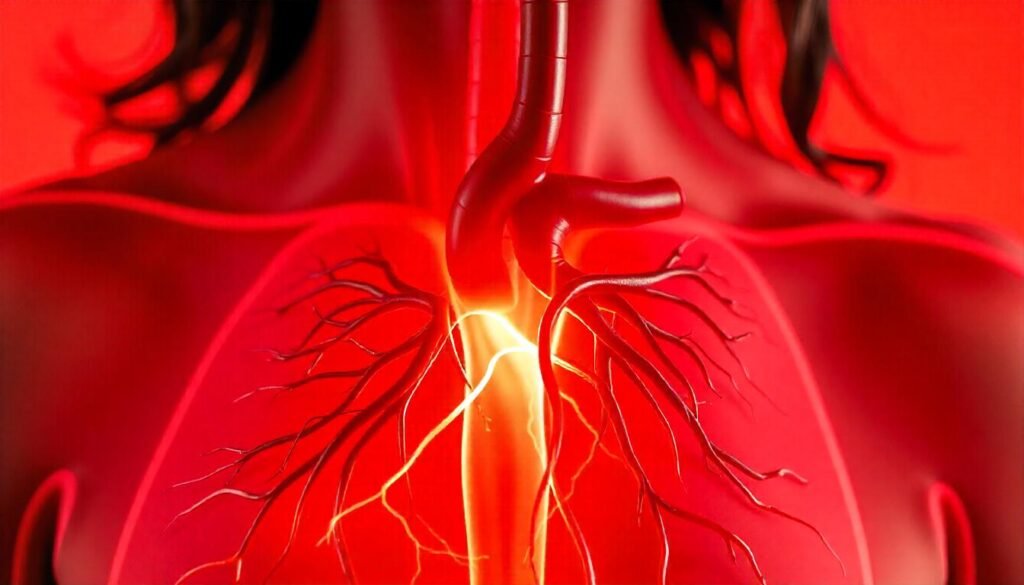This article examines five symptoms of cardiomyopathy, its causes, and available treatment options. Cardiomyopathy is a term that encompasses a range of diseases affecting the heart muscle, leading to various complications, including heart failure. This article aims to provide a comprehensive overview of cardiomyopathy, focusing on its symptoms of cardiomyopathy, types, causes, diagnosis, and treatment options. By the end, readers will gain valuable insights into managing this condition effectively.

Table of Contents
What is Cardiomyopathy?
Cardiomyopathy refers to diseases that affect the heart muscle, impairing its ability to pump blood effectively. This can lead to heart failure and other serious complications. Understanding what cardiomyopathy is can help individuals recognize its symptoms of cardiomyopathy and seek timely medical intervention.
Symptoms of Cardiomyopathy
The symptoms of cardiomyopathy can vary depending on the type and severity of the condition. Common symptoms of cardiomyopathy include:
- Shortness of Breath: Individuals may experience difficulty breathing during periods of physical activity, such as when exercising or engaging in moderate tasks. However, this symptom can also manifest even when the person is at rest, highlighting a significant concern for those affected.
- Fatigue: Many people suffering from cardiomyopathy report feeling an intense level of tiredness that goes beyond typical exhaustion. This profound fatigue can significantly hinder their ability to perform daily activities, making even simple tasks feel overwhelmingly challenging and draining.
- Swelling: The presence of fluid retention can result in noticeable swelling in various parts of the body, particularly in the legs and ankles. Additionally, this condition can extend to the abdomen, creating discomfort and a feeling of fullness that can further impact daily life.
- Palpitations: Patients may experience sensations of an unusually rapid or irregular heartbeat, which can be alarming. These palpitations may occur unexpectedly and can be accompanied by feelings of anxiety or concern about their health.
- Dizziness or Light-headeness: Many individuals may find themselves feeling dizzy or lightheaded, particularly during moments of physical exertion or activity. This unsettling feeling can pose a risk, as it may impair balance and coordination, making movement more difficult.

Recognizing these symptoms of cardiomyopathy are crucial for early diagnosis and treatment.
Types of Cardiomyopathy
There are several types of cardiomyopathy, each with distinct characteristics:
- Dilated Cardiomyopathy is recognized as the most prevalent form of cardiomyopathy, where the chambers of the heart experience enlargement and a subsequent weakening of the muscular walls. This condition can lead to a reduced ability of the heart to pump blood effectively, which can significantly impact overall heart function and health.
- Hypertrophic Cardiomyopathy is distinguished by the abnormal thickening of the heart muscle, which can create complications in its ability to function properly. This condition is often inherited and has the potential to lead to serious consequences, including sudden cardiac arrest in certain individuals, particularly among young athletes who engage in rigorous physical activity.
- Restrictive Cardiomyopathy is another type of heart disease where the muscle of the heart becomes stiff and inflexible. This rigidity makes it challenging for the heart to expand and effectively fill with blood between beats, ultimately impacting the heart’s overall efficiency in circulating blood throughout the body.
- Arrhythmogenic Right Ventricular Cardiomyopathy, commonly referred to as ARVC, is a rare form of cardiomyopathy characterized by the replacement of normal heart muscle tissue with fatty or fibrous tissue. This replacement not only alters the structural integrity of the heart but also disrupts its rhythm, leading to various arrhythmias that can pose significant health risks.
Understanding these types can help in recognizing the symptoms of cardiomyopathy and determining the appropriate treatment.
Causes of Cardiomyopathy
Several factors can lead to the development of cardiomyopathy, including:
- Genetics: Certain types of cardiomyopathy, particularly hypertrophic cardiomyopathy, have a hereditary component, meaning they can be passed down through family genetics. This genetic predisposition can significantly increase an individual’s risk of developing this condition, underscoring the importance of family medical history in assessing cardiovascular health.
- Coronary Artery Disease: When there is a reduction in blood flow to the heart muscle due to coronary artery disease, it can lead to a weakening of the heart muscle over time. This decreased blood supply hampers the heart’s ability to function properly and can result in various complications, including heart failure.
- High Blood Pressure: Chronic hypertension, or consistently high blood pressure, can cause the heart muscle to undergo hypertrophy, which is an abnormal thickening of the muscle. This condition may eventually impair the heart’s ability to pump effectively, leading to further cardiovascular issues if not managed properly.
- Infections: Various viral infections can have detrimental effects on the heart muscle, potentially leading to inflammation and damage. When the heart is compromised by such infections, it can alter its normal function, contributing to the development of cardiomyopathy and other serious heart conditions.
- Substance Abuse: The abuse of substances, particularly alcohol and certain recreational drugs, can play a significant role in the progression of cardiomyopathy. The toxic effects of these substances on heart tissue can lead to structural and functional changes, heightening the risk of developing this heart disease over time.
Identifying the underlying causes is essential for effective management.
How is Cardiomyopathy Diagnosed?
Diagnosing cardiomyopathy typically involves several steps:
- Medical History and Physical Examination: Initially, a qualified physician will conduct a thorough review of the patient’s symptoms of cardiomyopathy, including any discomfort or irregularities they may be experiencing. Additionally, the doctor will gather comprehensive information regarding the patient’s family medical history to identify any hereditary conditions that could be influencing the patient’s cardiovascular health. This step is crucial in establishing a clear context for the patient’s current health status.
- Imaging Tests: To gain a detailed understanding of the heart’s structure and function, various imaging tests, such as echocardiograms, magnetic resonance imaging (MRIs), or computed tomography (CT) scans, may be employed. These advanced imaging techniques allow healthcare professionals to visualize the heart in great detail, enabling them to assess any abnormalities or areas of concern that could be contributing to the patient’s condition.
- Electrocardiogram (ECG): The Electrocardiogram, commonly referred to as an ECG, is a vital diagnostic test that evaluates and measures the electrical activity of the heart over a period of time. By examining the heart’s electrical signals, this test provides valuable insights into the heart’s rhythm and overall electrical functioning, which can aid in diagnosing various cardiac issues.
- Blood Tests: A series of blood tests may also be conducted to uncover any underlying medical conditions that might be contributing to the development of cardiomyopathy. These tests are essential as they can reveal important biochemical markers and help identify conditions such as infections, autoimmune diseases, or metabolic disorders that may affect heart health.

Early diagnosis is vital for implementing treatment strategies effectively.
Cardiomyopathy Treatment Options
Treatment for cardiomyopathy depends on the type and severity of the condition. Common treatment options include:
- Medications: Treatment may involve a variety of medications, which are commonly prescribed to help manage symptoms of cardiomyopathy and enhance the overall function of the heart. These can include beta-blockers, which work to lower blood pressure and reduce heart workload; ACE inhibitors, which help relax blood vessels and improve blood flow; as well as diuretics, commonly known as water pills, that assist the body in getting rid of excess fluid and sodium. By utilizing these medications, patients can achieve better control over their condition and improve their quality of life.
- Lifestyle Changes: In addition to medication, making significant lifestyle changes plays a crucial role in managing heart health. Embracing a heart-healthy diet that is rich in fruits, vegetables, whole grains, and lean proteins is essential for overall cardiovascular well-being. Regular exercise, as recommended by a healthcare provider, should be incorporated into daily routines to enhance physical fitness and support heart function. Moreover, it is important to avoid alcohol consumption, as excessive drinking can lead to further complications. By implementing these lifestyle modifications, individuals can dramatically improve their health outcomes and reduce the risk of heart-related issues over time.
- Surgery: In cases where medical management is insufficient, surgical interventions might become necessary. For patients facing severe heart conditions, procedures such as implanting a defibrillator can provide critical support by monitoring heart rhythms and delivering shocks if a dangerous arrhythmia occurs. Furthermore, in the most critical situations, heart transplantation may be considered as a life-saving option. This approach involves replacing a failing heart with a healthy donor heart, offering a chance at a longer, healthier life for those in desperate need of advanced medical treatment.
Is Cardiomyopathy Hereditary?
Many forms of cardiomyopathy, particularly hypertrophic cardiomyopathy, have a genetic component. If a family member has been diagnosed, it is advisable to consult a healthcare professional for screening and potential genetic testing.
Cardiomyopathy Life Expectancy
Life expectancy for individuals with cardiomyopathy varies widely. Factors such as the type of cardiomyopathy, severity, and response to treatment play significant roles. With appropriate management, many individuals can lead fulfilling lives.
Can Cardiomyopathy Be Reversed?
While some aspects of cardiomyopathy can be managed or improved, complete reversal is not always possible. Early intervention and lifestyle modifications can significantly enhance heart function and quality of life.
Cardiomyopathy and Heart Failure
Cardiomyopathy can progress to heart failure, a condition where the heart cannot pump blood effectively. symptoms of cardiomyopathy regarding heart failure may include severe fatigue, persistent cough, and difficulty exercising. Managing cardiomyopathy proactively can help prevent this progression.
What Does Cardiomyopathy Feel Like?
Individuals with cardiomyopathy often describe a range of sensations, from fatigue and breathlessness to palpitations. These symptoms of cardiomyopathy can be distressing, highlighting the importance of seeking medical advice when they occur.
Cardiomyopathy in Young Adults
Young adults can also be affected by cardiomyopathy, particularly hypertrophic cardiomyopathy. Regular check-ups and awareness of family history are crucial for early detection and management.
Cardiomyopathy and Pregnancy
Pregnancy can pose unique challenges for women with cardiomyopathy. Close monitoring by healthcare providers is essential to ensure the health of both mother and child.
Cardiomyopathy and Exercise Restrictions
While exercise is beneficial for heart health, individuals with cardiomyopathy may need to follow specific guidelines. Consulting with a healthcare professional before starting any exercise regimen is crucial.
Cardiomyopathy and Alcohol Consumption
Excessive alcohol intake can exacerbate cardiomyopathy. Individuals diagnosed with this condition should limit or avoid alcohol to prevent further heart damage.
Cardiomyopathy and COVID-19
Recent studies have indicated that COVID-19 can impact heart health, potentially exacerbating existing cardiomyopathy. Individuals with this condition should be vigilant and consult healthcare providers regarding vaccination and preventive measures.
Cardiomyopathy and High Blood Pressure
High blood pressure is a significant risk factor for developing cardiomyopathy. Effective management of hypertension through lifestyle changes and medications can help reduce this risk.
Cardiomyopathy and Sudden Cardiac Arrest
Certain types of cardiomyopathy, particularly hypertrophic cardiomyopathy, can increase the risk of sudden cardiac arrest. Awareness of this risk is essential, especially for young athletes.
Cardiomyopathy and Diet Recommendations
A heart-healthy diet can play a significant role in managing cardiomyopathy. Recommendations include:
- Reducing Sodium Intake: Decreasing the amount of salt in your diet can play a significant role in effectively managing blood pressure levels and promoting overall cardiovascular health. By paying attention to the sodium content in the foods you consume, you can help maintain a healthier blood pressure.
- Incorporating Whole Grains: Consuming foods that are rich in fiber, such as whole grains, can greatly support the health of your heart. These grains not only provide essential nutrients but also contribute to better digestion and can help lower cholesterol levels.
- Eating Plenty of Fruits and Vegetables: Including a variety of fruits and vegetables in your daily meals is crucial, as they offer essential vitamins, minerals, and antioxidants that are beneficial for your body. These nutrient-dense foods support overall health and can help reduce the risk of chronic diseases.
- Choosing Lean Proteins: Opting for lean protein sources, such as fish and poultry, can have a positive impact on your diet and overall health. These options are not only lower in unhealthy fats but also offer important nutrients that can support muscle health and contribute to a well-balanced diet.
Cardiomyopathy and Fatigue
Fatigue is a common symptom of cardiomyopathy, often resulting from the heart’s inability to pump blood effectively. Managing symptoms of cardiomyopathy through medication, lifestyle changes, and support can help improve energy levels.
Conclusion
Understanding cardiomyopathy, its symptoms of cardiomyopathy, causes, and treatment options is crucial for effective management. Early diagnosis and proactive care can significantly improve quality of life for individuals affected by this condition. If you or someone you know is experiencing symptoms of cardiomyopathy, it is essential to seek medical advice promptly.
FAQ Section
1. What are the early signs of cardiomyopathy?
Early signs may include fatigue, shortness of breath, and palpitations. If you notice these symptoms of cardiomyopathy, consult a healthcare provider.
2. Can lifestyle changes improve cardiomyopathy?
Yes, adopting a heart-healthy lifestyle, including a balanced diet and regular exercise, can improve heart function and overall health.
3. Is cardiomyopathy always hereditary?
Not all types of cardiomyopathy are hereditary, but some, particularly hypertrophic cardiomyopathy, have a genetic component.
4. How often should individuals with cardiomyopathy see a doctor?
Regular check-ups are essential. Your healthcare provider will recommend a schedule based on your specific condition and treatment plan.
5. Can cardiomyopathy lead to other health issues?
Yes, cardiomyopathy can lead to complications such as heart failure, arrhythmias, and increased risk of sudden cardiac arrest. Regular monitoring and management are essential.
By understanding cardiomyopathy and its implications, individuals can take proactive steps towards managing their heart health effectively.
 >
>